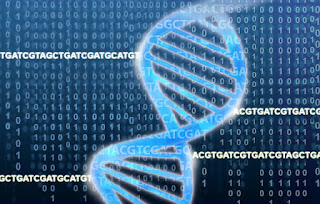 |
| Image: Public domain |
Doctors thought anxiety and depression among women was caused by the uterus itself, thus medicalizing simply being a woman, and the Greek word hysterikós described the mental suffering that arose from the uterus, thought to be the cause of the malaise, moodiness, and general despair (that couldn't have possibly been caused instead by the constraints and frustrations of women contained in a patriarchal society, where everything was controlled by men, and women themselves were considered "property"). Right? No, it was caused by hysteria. Or so it was thought.
Then there was germ theory: "Germs cause disease," and before you know it, everything was being treated with antibiotics. What did that get us? Superbugs that can't be killed with any antibiotics.
Granted, medicine's made strides--at least we don't think "angry gods" cause disease anymore (well, most people don't). But it seems that the mystery of disease is either attributed to forces we can't control, or if we make an advance like germ theory or genetics, suddenly everything is attributed to that new theoretical cause. I'm happy to say that these days, clearer-eyed clinicians realize that the causes of disease are often complex and multifaceted, involving environmental factors, psychosocial factors, and even political and economic factors such as poverty and racism--the so-called "social determinants of health."
Still, one's genetic programming is still thought to be--in my view--disproportionately ascribed as the cause of what ails folks, and yet we have failed to make significant progress in sorting out the "genetics" of things like heart disease, depression, diabetes, and many other conditions. But they keep looking.
 |
| Image: Courtesy National Human Genome Research Institute at genome.gov |
Over the last two decades or so we have built a substantial knowledge base that specifies how people metabolize different drugs. Given the propensity of doctors to prescribe more and more drugs to everyone all the time, it seems to me that one would want to know how those drugs will be processed by the body.
What should I avoid? What will work best with my own metabolism? Those seem to me to be reasonable questions. Within the last 10 years, there's been an explosion of genetic testing available that enables clinicians to know these things.
Genes determine how we metabolize drugs, how we process them in our bodies, because genes code for enzymes, and enzymes are what process drugs. These metabolic processes generally do two things with the drugs we take. One thing is that that they take prodrugs and turn them into active drugs that do helpful things. An example of this is the drug levodopa, used for Parkinson's disease. Levodopa isn't a "drug." It doesn't itself do anything. What the brain needs in Parkinson's disease is dopamine, but dopamine can't be given by mouth because stomach acid destroys it. It can't be given intravenously because it's too toxic to the heart in that form--and because would it really be useful if Parkinson's patients had to be on an IV drip all the time?
The body metabolizes levodopa into dopamine, in the brain, where it's needed, and this helps Parkinson's patients improve.
The other thing these processes do is take a drug and make it nontoxic so it can be eliminated from the body. If this didn't happen, drug would build up, and after helping us for a short while, it would then kill us! Not very therapeutic.
Some people are "normal" metabolizers, and a lot of drug dosing is based on this expectation. If things don't work out, say, the drug's action seems weak, we increase the dose. If the opposite happens, we get toxic side effects, we try lowering the dose. As one would imagine, this is a bit of trial and error, and the patient pays the price.
Wouldn't it be convenient if we could know before we prescribe how well a person is going to metabolize a drug? Wouldn't it make make prescribing more precise?
It would be great if we knew beforehand that a certain individual was a slow metabolizer and thus perhaps might not process a given dose very quickly, and possibly lead to significant side effects and toxicity. It would also be helpful to know if a person was fast metabolizer, and thus likely to need an increased dose or more frequent dosing in order to achieve therapeutic effects. It would be really useful to know if a person isn't going to benefit at all from a certain drug, because of their genetic programming.
Such testing exists, and for the last 10 years I have been advising my students that this version of personalized medicine is coming soon. But it is still not routine practice. It has become a lot more common in psychiatry, and that is the one medical field in which gene testing for drug metabolism has become something approaching "routine"--although I still see a lot of psychiatric prescribing that is still done the old fashioned way.
For the last year I have been offering this sort of testing to my patients. It is especially useful for those folks who have been put on a lot of medications by their various doctors. In many cases, we have found that some drug they are on should be swapped out for a drug better suited to their metabolism, or situations in which their side effects could be attributed to their "normal" dose, because they are slow metabolizers of that drug. There are cases in which a prodrug they were put on wasn't getting converted at all--they were taking a drug that couldn't do anything, because they are genetically programmed to not be able to convert it to the active drug, once ingested.
 |
| Image: Public domain |
know your profile, it's not like your genes are going to change. Pharmacogenomic testing can be shared with whatever doctors one sees, and apply to many classes of medications commonly prescribed. 2) It's often covered by insurance, because even though a lot of medical authorities seem to feel that such testing adds little to planning medical care, insurance companies see the value in profile-guided, individualized drug prescribing because in the end, it saves them more money than it costs in terms of the costs of weakly-treated disease, or conversely, drug toxicity.
If you are on several medications, if you expect to be on medications, or even if you just want the security of knowing that you have scientific data to share with your clinician concerning medicines that are best suited to your genetic profile: Ask your doctor--or me--about pharmacogenetic testing!
